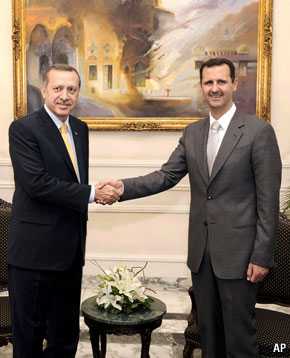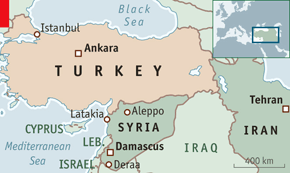Turkey’s tough talk on Syria is unlikely to be matched by action
Aug 20th 2011

IN A small café outside Istanbul’s Fatih mosque, a slight bearded man lifts his shirt to reveal two deep bullet wounds. “Assad’s soldiers did this to me,” says Motee Albatee, who served as an imam at a Sunni mosque in the besieged Syrian town of Deraa until he fled the country several weeks ago. Mr Albatee is among a growing number of Syrian dissidents who have found sanctuary in Turkey, many of them in refugee camps near the border. Some are angry over the reluctance of Turkey’s government to get tougher with Bashar Assad, Syria’s president. “Turkey must set up a buffer zone [inside Syria]” to protect more refugees from the fighting, insists Yayha Bedir, a member of the Syrian Muslim Brotherhood. Like many seated around the table, he believes only drastic action will force the Syrian army to defect en masse, bringing down Mr Assad’s brutal regime.
Such talk is particularly loud online, where Syrian tweeters have voiced disdain for Turkey’s attempts to get Mr Assad to end the bloodshed. Their fury grew earlier this month when Turkey’s foreign minister, Ahmet Davutoglu, flew to Damascus to deliver what Turkish officials tautologically called a final ultimatum. “We are at the end of our tether,” roared Recep Tayyip Erdogan, Turkey’s prime minister.
Mr Assad’s response was to intensify his assaults against unarmed civilians, notably in the Mediterranean port of Latakia (see article). This prompted Mr Davutoglu to issue yet another warning: Turkey would not, he said, “remain indifferent” to continuing massacres. Yet he also ruled out intervening to create a buffer zone. So what leverage does Turkey actually have over its erstwhile Ottoman dominion?
None whatsoever, say critics of Mr Davutoglu’s much-vaunted “zero problems with the neighbours” policy. That is unfair. But as Soli Ozel, a political scientist, puts it, the Syrian crisis has revealed that “Turkey isn’t as influential as it thought.”
The last time Turkey got tough with its southern neighbour was in 1998, when it threatened to invade unless Syria booted out Abdullah Ocalan, leader of Turkey’s outlawed rebel Kurdistan Workers’ Party (PKK). The Syrians caved in, and relations between the two countries have flourished since. Trade has more than tripled in the eight years of Mr Erdogan’s Justice and Development (AK) government, visas have been abolished and ministerial meetings have been held amid much fanfare. (Mr Davutoglu says he has made over 60 visits to Syria.) Crucially, Syria has ended its patronage of the PKK.
 Rapprochement with Syria has also allowed Turkey to play a bigger regional role. The government came close to brokering a peace deal between Syria and Israel before the plan was scuppered by Israel’s attack on Gaza. Some Turks hoped that engagement with Syria would eventually yank Mr Assad out of the orbit of Iran, his biggest patron, and set him on a path towards reform. (His alleged involvement in the 2005 car-bomb assassination of Rafik Hariri, the Lebanese president, was quietly ignored.) All the more reason for Turkey’s feelings of betrayal.
Rapprochement with Syria has also allowed Turkey to play a bigger regional role. The government came close to brokering a peace deal between Syria and Israel before the plan was scuppered by Israel’s attack on Gaza. Some Turks hoped that engagement with Syria would eventually yank Mr Assad out of the orbit of Iran, his biggest patron, and set him on a path towards reform. (His alleged involvement in the 2005 car-bomb assassination of Rafik Hariri, the Lebanese president, was quietly ignored.) All the more reason for Turkey’s feelings of betrayal.
Turkey’s Western allies are not about to mount an invasion of Syria. But they are turning the diplomatic screws, and are eager for AK to sever political and trade links with Mr Assad. But a bigger prize would be to drive a wedge between Turkey and Iran. Turkey’s mollycoddling of the mullahs has angered America, most recently when Mr Erdogan’s government voted against imposing further sanctions on Iran at the United Nations last year. Turkey has since sought to make amends. It has agreed to NATO plans for a nuclear-defence missile shield that is clearly aimed at Iran. And after some dithering, it is co-operating with the alliance’s military operations in Libya.
Yet Turkey is understandably wary of openly confronting Iran, one of its main sources of natural gas and the primary transit route for Turkish exports to Central Asia. Iran has also helped Turkey in its battle against the PKK—though it continues to flirt with hardliners who oppose any deal with the Turkish government. Lately the PKK has been stepping up the fight—some 30 Turkish soldiers have been killed in the past month. On August 17th, in a bid to quell mounting public anger, Mr Erdogan authorised the bombing of hundreds of PKK targets inside Kurdish-controlled northern Iraq. But such actions have failed in the past and the last thing Turkey needs is a hostile Iran.
Besides, many of AK’s pious constituents see the unrest in Syria as yet another America-backed Zionist plot to pit Turkey against Iran. The ultimate goal, their thinking goes, is to cut Turkey down to size. Disappointingly, the same line is parroted by the main opposition Republican People’s Party, for all its claims of change under its new leader, Kemal Kilicdaroglu.
So what are Turkey’s options? It can withdraw its ambassador from Damascus, continue to intercept the flow of weapons to Syria and impose economic sanctions. Other than that, as Mr Ozel suggests, it should desist from promising any more than it can deliver.
www.economist.com, Aug 20th 2011